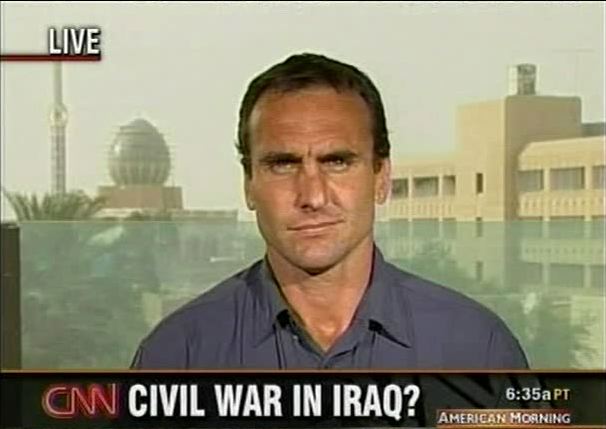AAM: “...just how dire this has become."

Click photo to play
Length: 3:55
SOLEDAD O'BRIEN: Violence at an all-time high. Does the definition of civil war really matter? What could a civil war in Iraq mean for U.S. troops? We've got a roundtable this morning.
CNN's Michael Ware joins us from Baghdad. He's covered Iraq for many years. John Pike is the director of globalsecurity.org. He's in Washington D.C., and CNN's senior political analyst Bill Schneider is in L.A. for us.
Gentlemen, good morning. Nice to see all of you.
A quick rundown of what some people have been saying about the definition of civil war, and the definition of what's happening in Iraq. Condi Rice says it's not a civil war. General Abizaid says it could move toward civil war. Secretary Rumsfeld says it is not a classic civil war. The former ambassador Peter Galbraith says it is a civil war. And Chuck Hagel says, well, maybe it's a civil war.
Bill Schneider, let's begin with you. Why does the definition, civil war or not, matter.
WILLIAM SCHNEIDER, CNN SR. POL. ANALYST: Because when Americans see the words "civil war," they read "can't win." What it means to Americans is this is a war between Shiites and Sunnis who are or murdering each other. It's their fight. It doesn't involve the United States. What's our interest in a fight between Shia and Sunni, very different from an Islamic radical insurgency they targets either the United States or the Iraqi government. That's an internal fight, one that the United States feels we have no side in.
O'BRIEN: Michael Ware, you've been on the ground there a long time. Does parsing the definition, splitting hairs, make a difference on the ground there?
MICHAEL WARE, CNN CORRESPONDENT: Well, when people are hunkered down in their suburbs, afraid to go to an adjoining suburb because it's dominated by a different religious sect, when they don't dare send their kids to school because they have to cross the sectarian lines, and when they're randomly finding the bodies of their neighbors in the streets and they live in fear of death squads from a U.S.- backed government Ministry of Interior showing up at their house in the middle of the night, I don't think definitions really matter.
You ask any Iraqi here and they will tell you they are mired in the blood of the civil war. And this sectarian strife is the legacy of the al Qaeda in Iraq leader Abu Musab al-Zarqawi. He mapped it out in 2004 -- he said, "This is what I plan to do." And the mere fact that Secretary Rice, President Bush, Secretary Rumsfeld and General Abizaid now have this term "civil war" on their lips shows you after their previous reluctance to mention it just how dire this has become.
O'BRIEN: They take a look at the number of displaced people, Michael Ware, don't they, when they're really calculating whether it's civil war.
WARE: Oh, absolutely. I mean, let's talked about the disruption of the lives of ordinary Iraqi people; 35,500-plus families have been internally displaced, now spread across 19 camps within the country, because they can't live in their own street anymore, because they've been driven out by a rival sect. I mean, to these people this very much does feel like civil war. I mean, you have these rival gangs, which are fighting each other in the streets.
And I mean, let's look at the heart of U.S. military intelligence. I mean, despite what the spokespeople say, their tests used to be a few months ago whether this kind of bloodletting between the sects has its own self-sustaining momentum, or whether it's just punctuated by Zarqawi's terrorist acts. You talk to them today, and they say, "yeah, we've now found that momentum. Our fear, though, is whether it spreads to the broader body politic."
So the definitions keeps shifting because the violence keeps reaching them as thousands and thousands are dying every month.
